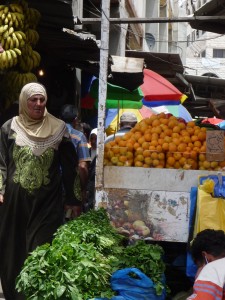I arrived in Ramallah a week or so ago, from America via Europe. This time, perhaps my 15th visit, it feels different – and not just politically, with stirrings around a possible Palestine statehood declaration in September. Personally, too.
Upon landing here in the West Bank, and taking up residency for the next few months in a flat in Ramallah, I found the familiar comfort of Arab hospitality – but now as someone who lives here, and is not just dropping in. This stay is fundamentally different from the many past trips when I parachuted into Jerusalem for two or three weeks, and lived out of a suitcase. There is something grounding about completely unpacking, finding the iron in the cupboard, counting the plates, thinking about putting things on the wall, and – most of all – shopping for provisions.
On my first night, my neighbor Sa’ad offered to walk me around the commercial center of Ramallah, in the 200-meter radius of the Manara, the Ramallah traffic circle guarded by a quartet of dignified, if sooty, stone lions. We set out in the cool evening, Sa’ad pushing his 20-month-old daughter in her stroller. He navigated from street to sidewalk, and around mounds of dirt and rubble: Ramallah’s streets are being torn up, one by one, to install new sewer and electrical lines. “Salma,” said Sa’ad, pointing at me as he paused in front of a pharmacy. “Say hello to Uncle.”
Sa’ad showed me where to catch the bus to Jerusalem, and the terminal where the vans go to Jenin, Nablus, Tulkarm and other West Bank destinations. He pointed out the best places to get fresh-squeezed juice, buy hummus, or linger over a glass of Arabic coffee. We walked around the hessbeh, the crowded, cacophonous Palestinian vegetable market where mounds of apples, tomatoes, eggplants, oranges, garlic and spices are trucked in every day from across Palestine and Israel. (Despite international calls for boycotting Israeli goods, Hebrew lettering on boxes of fruits is ubiquitous in nearly every cramped produce stall.) Sa’ad said he preferred to buy from the “ladies from the villages,” when possible. These old women sit on the sidewalk selling olives, grape leafs, cucumber, cheese and za’atar, the staple spice that is blended with olive oil and served at every Palestinian table. “It’s better because it’s organic,” Sa’ad said.
By now my black plastic bags were bulging with provisions, but Sa’ad wanted to take me on one last stop – to his favorite chicken butcher. He introduced me, said I had moved here for a while, and that the guys at the butcher shop should take good care of me when I come in for my chicken. Ala rasi, said the butcher with a big smile, touching the top of his head with the palm of his hand. The burden is on me. In other words, he’s happy to help make a new guy in town feel welcome.


